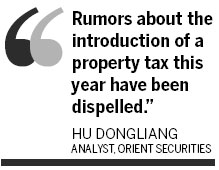Property stocks in dramatic rise
|
A worker at a construction site in Huaibei, Anhui province. The property sub-index in Shanghai rose 5.43 percent on Monday. Wu He / for China Daily |
Impact of austerity measures believed to have already affected housing sector
SHANGHAI - Property shares led the gains on Monday as the mainland's key stock index experienced its biggest one-day rise in more than eight months. The surge came on hopes that tightening measures made by the central government had already released their negative energy.
The Shanghai Composite Index ended at 2,673.42 points, up 3.48 percent, while the property sub-index rose 5.43 percent.
Su Xuejing, an industry analyst with Changjiang Securities, said the broad rally was a catch-up for the general slide over the past month. During the past 25 trading days since the central government announced the new property tightening policies, the Shanghai Composite Index lost an aggregate of 14.6 percent.
On April 16, the State Council churned out a series of austere measures to curb the rise in prices in the domestic housing market amid growing worries that the property bubble may burst.
These measures included making first-time buyers of property measuring more than 90 square meters put down a 30 percent deposit. Second-home buyers now need to put down a 50 percent deposit and pay a higher mortgage interest rate.
To further squeeze the market, the government imposed a temporary ban on people taking out mortgages on a third or more homes and buying homes in more than one city.

Hu Dongliang, an analyst at Orient Securities, said the worst has passed. "There is less concern now that harsher measures will be followed in the near term due to low trading volume. Rumors about the introduction of a property tax this year have been dispelled," he said.
Furthermore, the latest speech made by Premier Wen Jiabao dismissed concerns of further tightening policies. During his trip to the northern China port city of Tianjin, Wen stressed any macro-control should be timely and opportune and should avoid negative consequences amid complex domestic and international conditions. That signaled a milder policy towards the current market, said analysts.
In spite of the falling trading volume, property prices recorded a year-on-year 12.8 percent rise in April in China's 70 large- and medium-sized cities, reported the National Bureau of Statistics. Analysts expect price increases to ease in the coming months due to a lack of market support.
The central government's policy leaves room for local governments to apply their own interpretation of the rules in either a stricter or milder way for families holding more than one new commercial apartment. Forthcoming statistics will clarify market uncertainties, said Ma Ji, consulting manager at Shanghai Centaline China, a Hong Kong-based property consultancy.
Following the release by Beijing and Shenzhen of their detailed regulations, Shanghai is about to release its version. "The policies won't differ much from the existing State regulations and will not be stricter. Shanghai will make a prudent decision after seeing the feedback and effectiveness of other local government regulations," said Chen Jie, a professor at Fudan University.
Li Shaoming, an analyst from China Jianyin Investment Securities, predicted that property companies would see their cash flows tightened in the fourth quarter this year, and by that time some first-tier cities' property prices will have shed more than 30 percent, while some second-tier cities' house price will have dropped by as much as 15 percent.
"The government will keep a close watch on urban property market data for May before making a further decision on the housing market," Li said.
Seven out of the 99 real estate-related companies that Orient Securities monitors reached their daily upper limit of 10 percent on Monday. Shanghai-listed Poly Real Estate Group Co surged 8.87 percent to close at 12.15 yuan while sector heavyweight China Vanke rose 4.19 percent.
China Daily
(China Daily 05/25/2010 page17)









